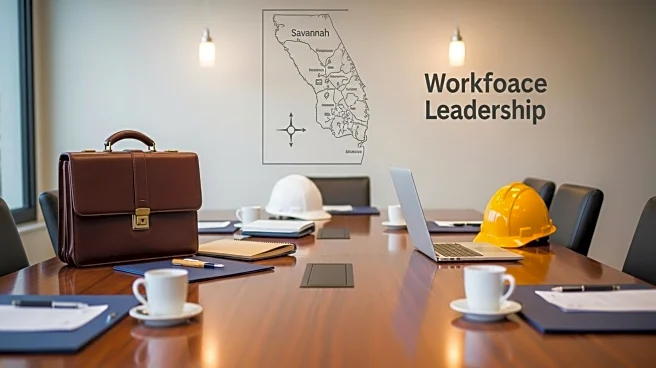What's Happening?
The Savannah Downtown Business Association hosted a luncheon to discuss strategies for addressing the region's workforce shortage. Anna Chafin, President and CEO of Regional Industry Support Enterprise (RISE), highlighted efforts to bolster the local workforce across eight counties. A 2023 study projected a deficit of over 10,000 jobs by 2031 if no action is taken. RISE is collaborating with various organizations to focus on military families, workers with disabilities, and education initiatives. The luncheon featured panelists from the Savannah Area Chamber of Commerce, WorkSource Coastal Georgia, Savannah Technical College, and other local entities, emphasizing the importance of diverse hiring practices and workforce development.
Why It's Important?
The workforce shortage in the Savannah region poses significant challenges for local economic growth and development. Addressing this issue is crucial to ensuring that businesses can meet their staffing needs and continue to thrive. The collaborative efforts led by RISE and other organizations aim to create a more inclusive and skilled workforce, which could enhance the region's competitiveness and attract new industries. By focusing on underrepresented groups and providing education and training opportunities, these initiatives could lead to more equitable economic outcomes and support community resilience.
What's Next?
A new workforce study is planned for 2026 to assess the effectiveness of ongoing development efforts. This study, funded by a Georgia Power grant, will provide insights into the region's progress and help guide future strategies. Organizations involved in workforce development will continue to implement programs and partnerships to address the job shortage, with a focus on education, military retention, and inclusive hiring practices. The results of these efforts will be critical in shaping the region's economic landscape and ensuring sustainable growth.
Beyond the Headlines
The emphasis on hiring people with disabilities and military families highlights broader societal shifts towards inclusivity and diversity in the workplace. These efforts reflect changing attitudes and policies that prioritize equal opportunities and recognize the value of diverse perspectives. The success of these initiatives could influence other regions to adopt similar approaches, contributing to a more inclusive national workforce.









